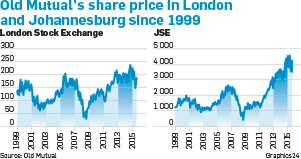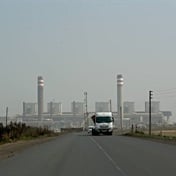
The shake-up of the local banking and financial services sector continued this week, with Old Mutual following in the footsteps of Barclays by announcing a major restructuring.
Old Mutual, one of the oldest and most dominant financial services groups in South Africa, will cease to exist in a year or two after breaking itself into four pieces, one of which is Nedbank, with a market value of R86 billion.
This will in effect cut the post-apartheid ties with London of another major South African bank, and the country’s major insurer. However, the group is not putting another of South Africa’s Big Four banks up for sale.
Old Mutual CEO Bruce Hemphill told City Press in an interview on Friday afternoon: “It would be a mistake just to say this stake is for sale and provide no other details. That’s not good for Nedbank or our country.”
That is, however, exactly what London-based banking giant Barclays did last week with an open-ended announcement that it intended to sell most of its majority stake in Barclays Africa.
Barclays and Old Mutual both have new chief executives with restructuring agendas. Hemphill joined Old Mutual in November and Barclays boss Jes Staley joined a month later.
Old Mutual’s plan is to unbundle most of its 54% stake in Nedbank to its own shareholders and let them decide what to do with it.
Old Mutual is calling its break-up plan “managed separation” and its end goal is to overcome the apparent “conglomerate discount” that makes the group worth less than the sum of its parts.
One shareholder had told him that the current “mixed bag of assets” that make up Old Mutual was “uninvestable”, said Hemphill.
The four units Old Mutual wants to separate include Nedbank and Old Mutual Emerging Markets, which owns the insurance businesses in South Africa and elsewhere on the continent. The remaining two parts are Old Mutual Wealth – which largely manages wealthy clients’ money in the UK – and Old Mutual Asset Management, a group of seven asset managers in the US.
The main problem is that Old Mutual mixes “emerging and developed market” assets in one company. Investors generally want one or the other and are often mandated to not take the risk associated with emerging markets despite perhaps wanting to buy into the US- and UK-based parts of Old Mutual, said Hemphill.
That, however, suggests that the logical course of action would be to split Old Mutual into two parts, not four, since Nedbank and the emerging markets division are both catering to the same market.
But there is a problem with that line of thought, warns Hemphill. “It is incredibly hard to mix a bank with insurance.”
“In the investor universe, people generally invest in one or the other. They are completely different business models.” But according to Old Mutual financial director Ingrid Johnson, the estimates of the “conglomerate discount” that have been doing the rounds are exaggerated.
Brad Preston, chief investment officer of Mergence Investment Managers, said, as quoted by Bloomberg, that some analysts saw a 20% effect. The company’s emerging market business might be listed on the Johannesburg exchange, he said.
“We think that’s too high; it’s probably around 10%,” said Johnson. The group as a whole had a market capitalisation of £6.7 billion (R147 billion) on Friday.
According to Michael Jordaan, the respected former CEO of FNB, the break-up plan made sense. Getting rid of Nedbank would, however, be a mistake, he said.
“It would be far better to use the capital from selling the other units to increase their stake in Nedbank. Nedbank could also have used the capital to increase its share in [Pan-African banking conglomerate] Ecobank and build a proper African banking group.”
The plan to break up the group was a complete reversal of its strategy since listing in London in 1999, but that was not an indictment of the old strategy, according to Hemphill. “In 1999 when Old Mutual listed, it had lots of support. It raised a lot of capital and spent a lot of money. It spent some of it poorly and some of it wisely.
“There have been significant regulatory interventions since 2009. For a long time, financial businesses tried to grow. Now the concentration risk is an issue and regulators are trying to break up the international financial conglomerates by imposing more onerous regulations.”
These new rules are evidently working and have been cited by both Old Mutual and Barclays as a major reason for getting out of their respective South African banking subsidiaries.
Costs also feature. The cost of maintaining Old Mutual’s head office in London came to £80 million last year. That would be eliminated over time, said Hemphill.
According to Bloomberg, Garth Mackenzie, founder of TradersCorner.co.za, said: “The deals say a lot about the state of the global economy and companies trying to reposition themselves for a tougher global economic environment.”
Though the depreciation of the rand against the pound certainly “irritates” shareholders seeking dividends in pounds, the rand was “not an issue” in the internal review that had started in November and then led to the break-up plan, said Hemphill.
‘NOT COMING HOME’
“It is not about coming home or moving the listing,” Hemphill insisted more than once in a teleconference with journalists on Friday morning.
If Nedbank were ultimately unbundled, it would, however, make more sense for it to be on the South African share register, as opposed to getting it a new listing in London, he added. “It is very early days ... It is premature to talk about that,” he said.
“We’ve just made a massive strategic decision and it is not entirely certain how it will play out.”
Hemphill said that he was “reasonably certain” that the plan could be executed by the end of 2018, but he “wouldn’t bet his life on it”. Although he had said it would make sense for Old Mutual’s ultimate minority stake in Nedbank to be around 15%, he added that he “wouldn’t want to be held to that”.
It was “conceivable” that the London-based company would retain shares in the four separate businesses. However, like everything else, this remained to be seen. The leaked news of the break-up plan sent Old Mutual shares in London up by 7% last Monday.
After the official announcement, made alongside financial results, the share price fell by 1.35% on Friday to 182.8 pence. Nedbank’s shares on the JSE on Friday closed down 3.86% at R175.
SA COMPANIES THAT HAVE MOVED THEIR LISTINGS TO LONDON AND ELSEWHERE
2000 Dimension Data London
takeover by Nippon Telegraph and Telephone




 Publications
Publications
 Partners
Partners








